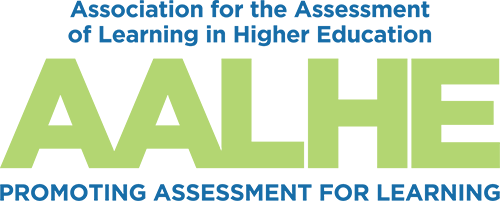- Home
- About AALHE
- Board of Directors
- Committees
- Guiding Documents
- Legal Information
- Organizational Chart
- Our Institutional Partners
- Membership Benefits
- Member Spotlight
- Contact Us
- Member Home
- Symposium
- Annual Conference
- Resources
- Publications
- Donate
EMERGING DIALOGUES IN ASSESSMENTHelping Students Link Course Content To Their Own Lives Through Utility-Value Writing Assignments April 26, 2023 Ellen M. Wisner, PhD, University of North Carolina at Charlotte As humans, we rely on our ecosystems for food, shelter, and important services like flood protection and water purification. A basic understanding of ecology, the study of organisms and their interactions with the environment, helps students become ecologically conscious creating more well-informed citizens. At the University of North Carolina at Charlotte, students are required to take an ecology course as part of the major in Biological Sciences. Typically, this course is taken in a student's second or third year, after the prerequisite sequence of General Biology. Most biology majors at UNC Charlotte plan to work in healthcare fields, and many find it difficult to see the relevance of ecology to their lives or professional goals. From my experience teaching this course, it seems like this challenge leads to a lack of motivation in the course, with students not committing as much time and effort towards the ecology class as they do in other courses. In addition, my past students have struggled to explain why ecological concepts matter. I began to wonder how I could help students see the links between ecology and their personal lives, in order to increase their motivation and long-term retention of the course material. Utility-value assignments I became familiar with the concept of “utility-value” assignments by participating in professional development with the Office of Assessment at UNC Charlotte. Utility-value means the perceived usefulness of the material (Hulleman et al., 2021). For example, do students believe the material will help them achieve a future goal, or do they think the course material will be useful to them in their everyday lives? Students work harder and perform better with course topics that they consider valuable or personally relevant (Brown et al., 2015; Curry et al., 2020). A series of research studies found that incorporating short, written utility-value assignments (in which students connect course content to their own lives) improves student performance and student persistence in STEM (Canning et al., 2018), and reduces the achievement gap between students of advantaged and disadvantaged backgrounds (Harackiewicz et al., 2016). Based on this evidence, I became convinced that a similar utility-value intervention might help my ecology students become more engaged with the material and retain the information for a longer period. The Intervention In the Fall of 2022, I incorporated three short utility-value assignments into my 76-student Ecology course. These assignments were based directly on those used in Canning et al. (2018) and Harackiewicz et al. (2016). The written prompt was as follows and included the rubric for grading the assignment: “Select a topic from the last 2 weeks of class, and formulate a question about that topic. Write a 300-500 word response discussing the relevance of this question and topic to your own life. Be sure to include some concrete information that was covered in this unit, explaining why this specific information is relevant to your life or useful for you. Be sure to explain how the information applies to you personally and give examples. Rubric for grading: The students completed this assignment three times during the semester: within the first month, near mid-term, and on the last day of classes for the semester. Students submitted their responses through the course’s learning management system and received feedback and a score for each assignment. Although graded, these were low stakes assignments worth ~ 1% of the final course grade. Student Response Overall, students responded positively to the prompt, reporting a variety of ways that the course material related to their lives and goals. For example, students learned in class about ocean currents and how climate change might affect these currents. In their reflections, one student mentioned that he was a salt-water fisherman and was interested in temperature changes in the ocean and how that might affect where specific fish are found. This is a great example of how course material may relate to a student's life in a way that the instructor may not be aware. Several students mentioned how much they enjoyed the assignments, and their thoughtful and thorough responses to the prompts suggested that they enjoyed the assignment. Typically, in science classes, most assignments are content focused and do not allow for much creativity. These assignments were much more personal and gave the students space to be creative, reflective, and share a bit about their own lives, allowing them to feel more connected to the material they were learning. Instructor Response This intervention led to unexpected impacts on my teaching. Creating the intervention and seeing the students’ responses changed my mindset of how I should approach teaching the ecology course. Specifically, I now make a conscious effort to show students how the material applies to their lives. When I taught the class in the past, I incorporated case studies and examples, but I began to wonder how I could help students link the content to their lives and to make it more relevant for them. I started out by connecting course content to current events and more consistently asking students why this information matters to them. After seeing the positive reception of the utility-value assignments, I added a few questions to student’s exams asking them to explain how a concept they had learned in the unit applied to a specific real-world situation. Moving forward, I plan to reorganize the class into modules, each of which addresses a major issue that we are facing currently in the world. In other words, all concepts in the class would be tied back to a utility-value example. I also intend to solicit more feedback through student surveys to see how the integration of utility-value assessments and examples impact student engagement in the course. Major Takeaways Because we are passionate about our fields, we, as instructors, may assume students automatically see why the material is important. What I have learned is that this is not necessarily the case. We need to provide students with examples and opportunities to discover the importance of course content on their own. Adding three short utility-value writing assignments offered my students the chance to reflect on how course material related to their own lives. This assignment was easy to incorporate and took little time to grade. It not only helped students to connect the course material with their own lives, but it helped me to get to know them better as individuals. More importantly, it inspired me to reflect upon my course and teaching philosophy so that I could more intentionally help students understand how the course material relates to their everyday lives. References Canning, E. A., Harackiewicz, J. M., Priniski, S. J., Hecht, C. A., Tibbetts, Y., & Hyde, J. S. (2018). Improving performance and retention in introductory biology with a utility-value intervention. Journal of Educational Psychology, 110(6), 834. Brown, E. R., Smith, J. L., Thoman, D. B., Allen, J. M., & Muragishi, G. (2015). From bench to bedside: A communal utility value intervention to enhance students’ biomedical science motivation. Journal of Educational Psychology, 107(4), 1116. Curry Jr, K. W., Spencer, D., Pesout, O., & Pigford, K. (2020). Utility value interventions in a college biology lab: The impact on motivation. Journal of research in science teaching, 57(2), 232-252. Harackiewicz, J. M., Canning, E. A., Tibbetts, Y., Priniski, S. J., & Hyde, J. S. (2016). Closing achievement gaps with a utility-value intervention: Disentangling race and social class. Journal of personality and social psychology, 111(5), 745. Hulleman, C. S., & Harackiewicz, J. M. (2021). The utility-value intervention. Handbook of wise interventions: How social psychology can help people change, 100-125. |

